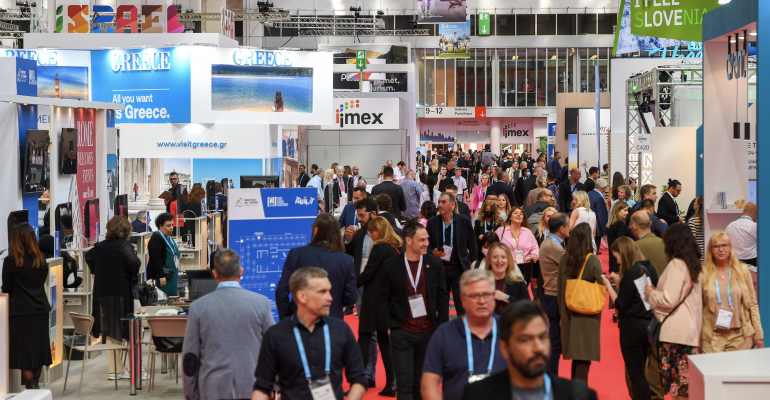For the first time since May 2019, the IMEX Frankfurt show took place in person at Messe Frankfurt in Germany, from May 31 to June 2. Of the 9,000 attendees, more than 3,000 were buyers looking to place their upcoming meetings, exhibitions, and incentive programs.
In addition to one-on-one appointments between exhibitors and planners, a series of educational sessions took place to deliver a better understanding of the post-pandemic landscape for planning and executing events. “We’ve had no roadmap for the past couple of years,” said Michelle Mason, FASAE, CAE, president and CEO of the American Society of Association Executives, at the start of the show. “Even as we now build towards business recovery and growth, no single organization has all the answers. Sharing knowledge, experiences, and best practices gives [meeting] leaders the greatest opportunity to innovate and position their [events] for continued growth and impact.”
One topic that was ripe for discussion: Shorter lead times and niche events have become more common. “Organizers are understandably jittery right now,” given the still-uncertain future of travel because of Covid, said Cathy Breden, managing director of CEIR and CEO of International Association of Exhibitions and Events. “This has led to shorter [planning] cycles and new models such as smaller niche and regional events, which present new opportunities for both sides of the industry.”
To adapt, Breden suggests that organizers explore co-location opportunities and targeted market opportunities while focusing more on year-round engagement. She also noted that “omnichannel marketing and communications are here to stay. Make sure you understand what your omnichannel strategy is for reaching all your different audiences and stakeholders. Digital is complementary, not competitive, to the live, in-person event.”
Another hot topic on the show floor: A rising emphasis on wellness at events, but now with a focus on end-to-end duty of care for attendees that includes their mental health. This is a shift from the traditional focus on healthy food and beverage choices at meals along with yoga and physical-activity options—although those elements are expected by attendees as well.
 The revitalization of cities is central to the future of the business-events sector, given that many workers no longer must show up to an office every day. In fact, business events will be critical to making cities healthy again, said Greg Clark of The Business of Cities, a consultancy for urban studies and trends. “The pandemic has caused a loss of confidence in the idea of human concentration in city centers, which means there is a need to reinvent them. Business events should see how they can be part of this revitalization, because that would have the biggest multiplication impact” in terms of F&B and entertainment outlets, service businesses, and residents returning to city centers.
The revitalization of cities is central to the future of the business-events sector, given that many workers no longer must show up to an office every day. In fact, business events will be critical to making cities healthy again, said Greg Clark of The Business of Cities, a consultancy for urban studies and trends. “The pandemic has caused a loss of confidence in the idea of human concentration in city centers, which means there is a need to reinvent them. Business events should see how they can be part of this revitalization, because that would have the biggest multiplication impact” in terms of F&B and entertainment outlets, service businesses, and residents returning to city centers.
As for the buying-and-selling atmosphere on the show floor, some exhibitors noted especially robust demand for events happening within the next 12 months. Daniel Reid, assistant vice president of global sales for Shangri-La Group, said that his team fielded nearly a dozen inquiries for corporate meetings of 250 to 400 people to be held between November 2022 and April 2023 in cities ranging from Tokyo to London.
 Carina Bauer, IMEX Group CEO (in photo), added that “we’ve heard about some huge event contracts being signed and a high volume of business deals getting done. All indicators suggest that 2023 and 2024 are going to be very good years for our industry. However, we can’t deny the challenges of a new business reality: labor shortages, supply chain issues, and travel disruptions, among others. However, planners are adaptable and resourceful and have learned a lot” about the new events landscape. “And suppliers are doing their best to flex and respond. The future looks bright.”
Carina Bauer, IMEX Group CEO (in photo), added that “we’ve heard about some huge event contracts being signed and a high volume of business deals getting done. All indicators suggest that 2023 and 2024 are going to be very good years for our industry. However, we can’t deny the challenges of a new business reality: labor shortages, supply chain issues, and travel disruptions, among others. However, planners are adaptable and resourceful and have learned a lot” about the new events landscape. “And suppliers are doing their best to flex and respond. The future looks bright.”





